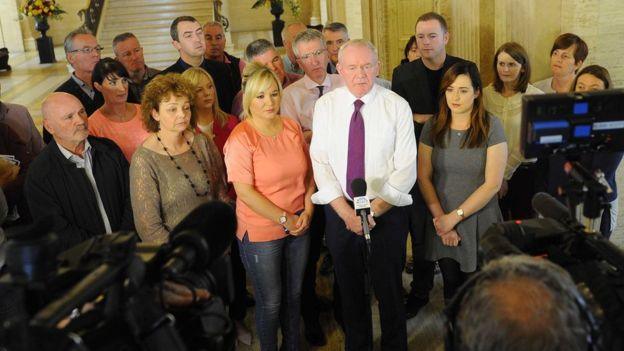Michelle O'Neill: Who is Sinn Féin's new Northern leader?
- Published
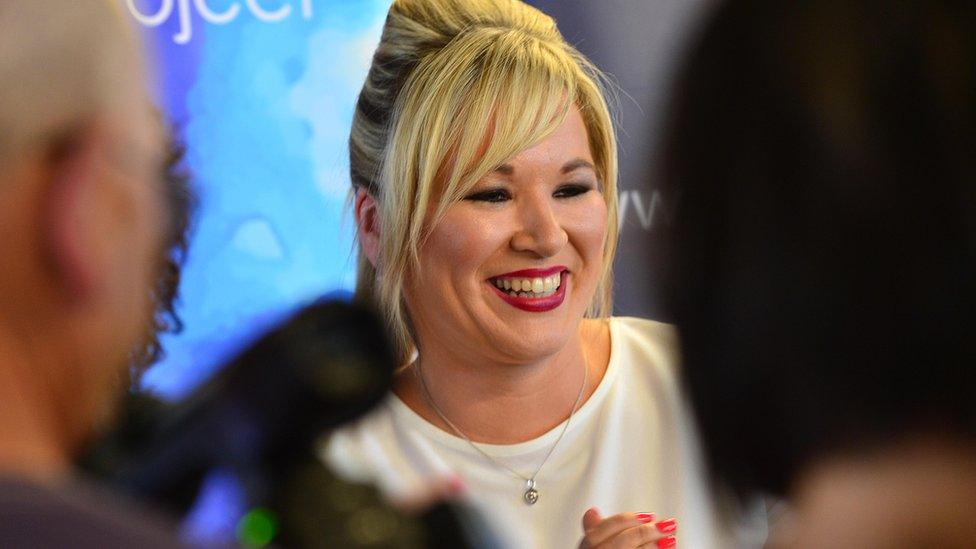
Michelle O'Neill began working for Sinn Féin in 1998
Michelle O'Neill may be seen as the future of Sinn Féin, but she grew up steeped in the history of Northern Ireland's Troubles.
Born Michelle Doris on 10 January 1977, she was raised in the village of Clonoe in rural County Tyrone and hails from a family of prominent Irish republicans.
Her father, Brendan 'Basil' Doris, external, was a former IRA prisoner who became a Sinn Féin councillor in Dungannon.
Her uncle, Paul Doris, is president of Noraid, a republican fundraising group.
As a teenager, she was educated at St Patrick's Academy in Dungannon and after leaving school she began training to become an accounting technician.
However, when the Good Friday Agreement was signed in 1998, she began working for Sinn Féin.
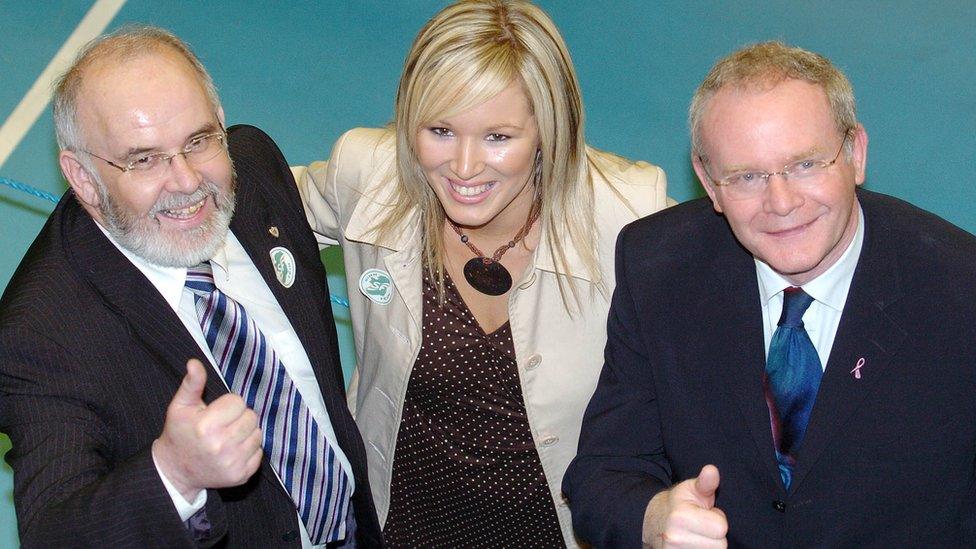
Michelle O'Neill pictured with Mid Ulster MP Francie Molloy and Martin McGuinness in 2007
It brought her into direct contact with Martin McGuinness, who at that time was running for election in the Mid Ulster constituency.
In addition to working with him and his fellow Mid Ulster MLA Francie Molloy, she spent this period training as a welfare rights adviser.
When her father stepped down from Dungannon Borough Council ahead of the 2005 election, she won the seat he vacated in the Torrent electoral area.
She would later become the first woman to hold the post of mayor in the borough.
While serving as mayor, she hosted a ceremony to commemorate the death of a family friend who was shot dead while taking part in an IRA operation.
Rise through the assembly
Martin McCaughey was armed with an AK47 rifle when he fellow IRA man Dessie Grew were shot more than 30 times by an SAS unit near Loughgall in County Armagh in 1990.
Speaking at the 2010 ceremony, she paid tribute to the IRA man and said: "Twenty years ago the political climate was very different than it is now."
She claimed that there had been "a relentless loyalist campaign, funded and directed by the state, and which resulted in the murders of many of our activists, their family members and friends".
Her assembly career began in 2007, when she joined Martin McGuinness and Francie Molloy as a Mid Ulster MLA.
She became her party's spokeswoman for health and sat on the education committee.
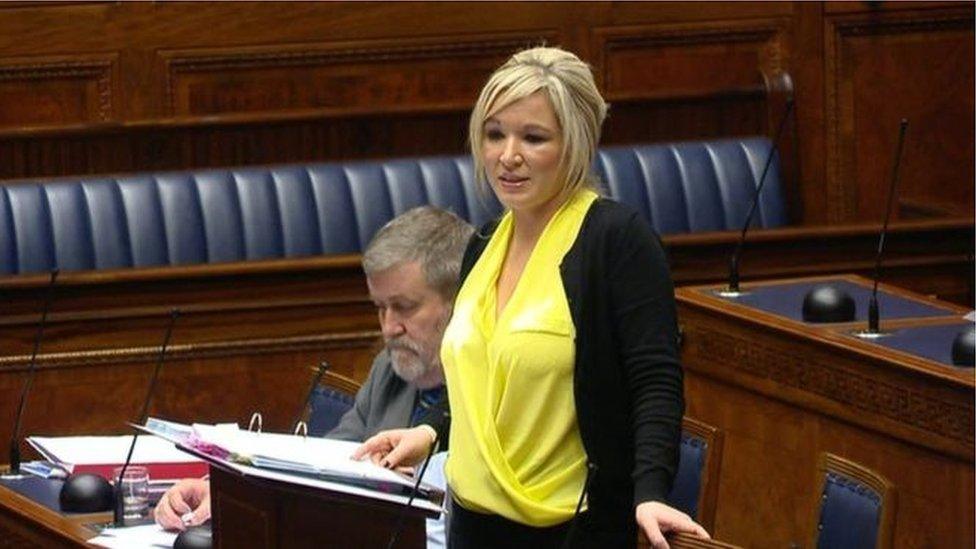
Michelle O'Neill rose to the role of agriculture minister before becoming health minister in 2016
After four years on the back benches at Stormont, Sinn Féin appointed her as minister for agriculture in 2011.
Her most significant announcement in that role was moving the Department of Agriculture and Rural Development's headquarters from Belfast to a former Army barracks in Ballykelly, County Londonderry.
Strabane had been chosen as a more suitable location by an internal DARD assessment but it was a decision that Mrs O'Neill then overruled.
In 2015, she was promoted to minister for health, one of Stormont's most high-profile and challenging portfolios.
She was faced with mounting hospital waiting lists, a crisis in general practice and the findings of the Bengoa report into how Northern Ireland's health care is organised.
Forefront
Her response was a 10-year plan to transform health service, saying it would improve a system that was at "breaking point".
Opposition politicians questioned the lack of details in the plan, which was not costed.
But it set out a range of priorities, including a new model of care involving a team of professionals based around GP surgeries.
Married to Paddy O'Neill, she has two grown-up children, 23-year-old Saoirse and Ryan.
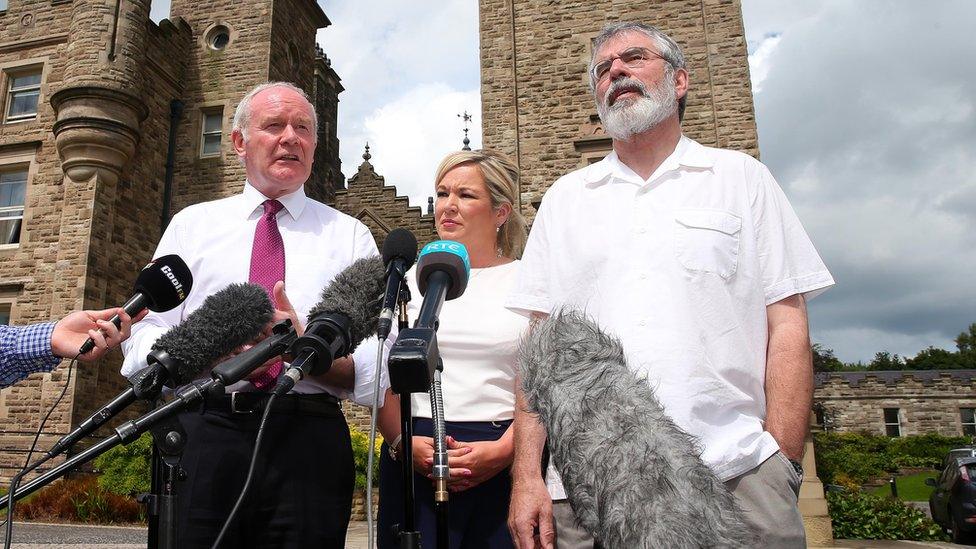
Michelle O'Neill has taken on an increasingly prominent role for Sinn Féin since the RHI scandal broke
She outlined her hectic daily schedule to the Irish News, external last summer.
"I get up around 6am, attempt a gym class - maybe spin or body pump," she said. "I always check in with emails and social media and put the radio on to hear the headlines.
"Then I shout up the stairs to my son Ryan to get up for work; that's probably only about five times more exhausting than the gym!"
On the eve of her 40th birthday, her friend and mentor Martin McGuinness announced his resignation as deputy first minister in protest over a botched energy scheme.
Mrs O'Neill has been at the forefront of her party's response to the Renewable Heat Incentive (RHI) scandal and has been forthright in her statements.
In a press conference on 11 January, she said Sinn Féin was "not interested" in further negotiations with the Democratic Unionist Party (DUP) and was demanding an immediate election.
Now she will face one at the forefront of Sinn Féin leadership north of the border.
- Published19 January 2017
